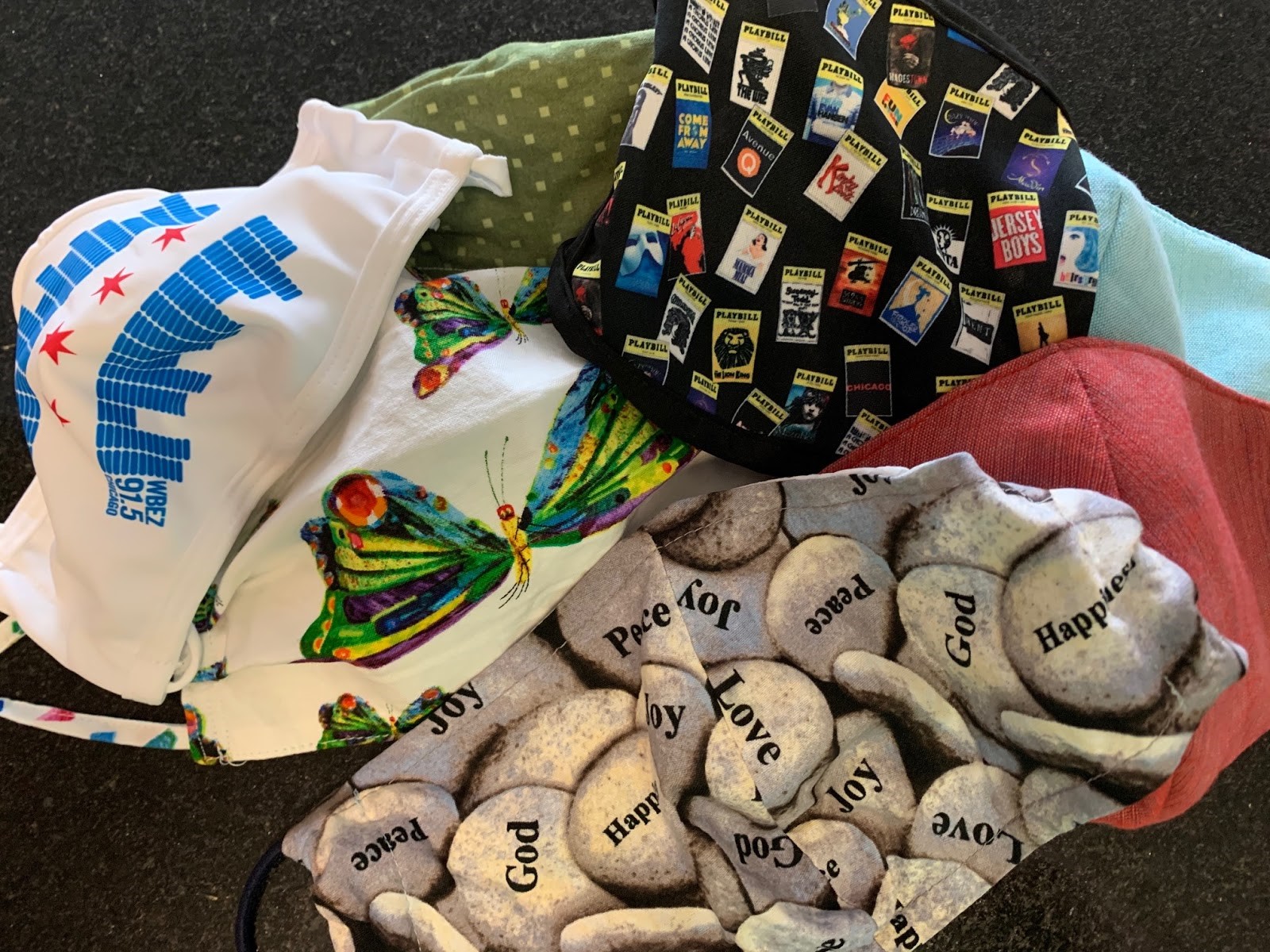Physically Distanced but Spiritually Connected
A Matter of Masks

A handful of my masks — in the city I frequently wear several a day.
Dear Mayfield,
The often-contested face mask has been worn by many of us for weeks now. I don’t come and go now like I used to, but I usually wear at least two masks a day. The green mask in the back was the first one I received from the Robs at the beginning of the at-home mask making blitz of the DeKalb County Quilting Guild. The plain light blue and red masks are part of a fair trade mask pack crafted by women in Cambodia. The theatre mask is one of two that I have.The Robs remind me that those are masks to wear when we are feeling sharply the absence of live theatre in our lives. Becky stitched the butterfly mask from Eric Carle fabric (The Very Hungry Caterpillar) that I ordered early in Covid-19 time. It reminds me of the preciousness of the Mayfield Monarch Waystation and all of the habitat restoration efforts around the country and globe and also of my abiding love for children’s books. The mask with the stones and words was made by Joann and came to me through Peggy. Joann has no idea how many stones from Lake Michigan I have hauled home over the years. And finally there is my public radio supporter’s mask sporting WBEZ’s variation on the Chicago flag. How many hours of NPR have I soaked up since it went on air in May of 1971? Yes, these masks place a physical barrier between me and others, but masks by association can keep us connected to people, to causes, and to joys that are of importance to us. In the words of the Boone County Department of Health, we can wear masks as an expression of our collective responsibility. In the words of the gospel, we can wear masks as a tangible expression, as a sacramental act of loving our neighbor.
I have two favorite masks stories at the moment, stories that renew hearts and souls, stories of generosity set loose, stories near and far. The first story is from France and involves seamstresses from a number of the most elite and fabled design houses in the world. On March 18, the day after the lockdown began in Paris, Marie Beatrice Boyer, a seamstress for Chanel formed a collective named Tissuni (a combination of sounds from the French words for “united” and “fabric”). More than 100 others joined her, a number of them haute couture seamstresses from Chanel, Dior, Saint Laurent, Jean Paul Gaultier, Schiaparelli, and the Paris Opera. Then they began sewing 3000 masks for the “front line” — hospital workers, cashiers, delivery people, taxi drivers, bakers, firefighters, and others. They tapped their personal fabric supplies and made use of old curtains, pillowcases, and clothing. A few words from Marie Boyer sums this story up well: “You realize that a simple piece of fabric, well cut, can have a direct impact on people’s lives. We will never see a more beautiful collection than that of all the masks made and distributed free of charge by all the seamstresses and dressmakers from all houses and all regions.”
The second story begins at Mayfield and highlights our deep bond with JAMS, the Jane Adeny Memorial School, in Kenya. Toward the end of June a concern was voiced for masks needed at JAMS when school is in session again in September. Quilting Rob took on the task. Fabric was purchased in school colors and will look beautiful with the girls’ uniforms. Kits were prepared including pre-cut fabric, elastic, and directions. And the call went out to Mayfield for “anyone who can sew a straight line.” The goal was 400 masks to be completed in about a month and to be ready for whenever Teresa can get to Kenya in late July or after. Rob, Joann (Peggy’s mom), Diane (a friend of Jen’s) and Sue have been busy stitching, and all 400 are almost done, right on schedule. Accompanying the masks will be a maintenance kit with supplies and instructions for any future mask repair. Diana will preserve this delightful local and international story in the next newsletter for Friends of JAMS.
Gwendolyn Brooks, American poet, author, teacher, poet laureate, and winner of the Pulitzer Prize for Poetry once penned these words: “We are each other’s harvest; we are each other’s business; we are each other’s magnitude and bond.” She wasn’t writing about face masks in a pandemic, but the words fit well. From the streets of Paris to the corn fields of DeKalb County to a school for girls in Kenya, the matter of masks is a matter of shared care, connection, and creativity with and for an ever-growing circle of others.
Peace, Martha

